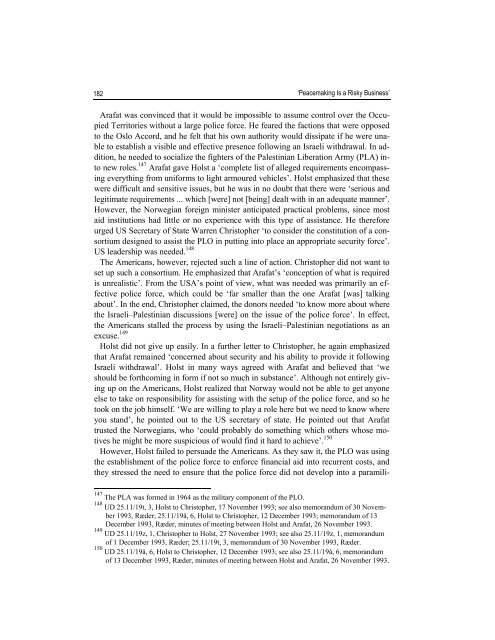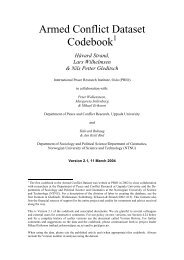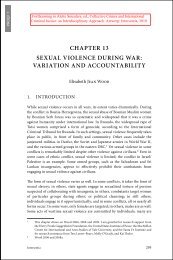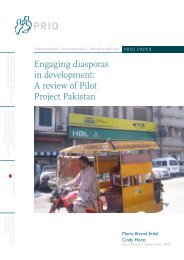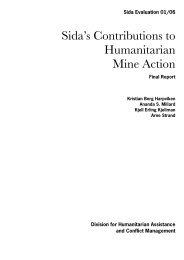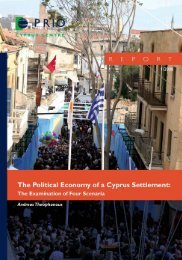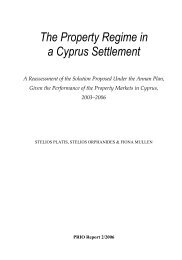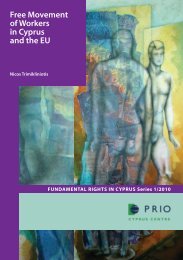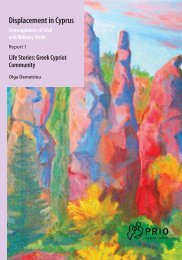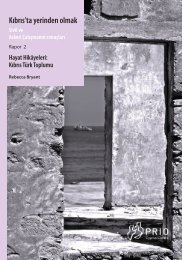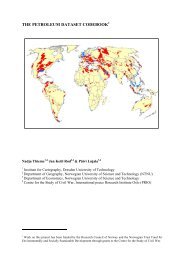Peacemaking Is a Risky Business - PRIO
Peacemaking Is a Risky Business - PRIO
Peacemaking Is a Risky Business - PRIO
Create successful ePaper yourself
Turn your PDF publications into a flip-book with our unique Google optimized e-Paper software.
182 ‘<strong>Peacemaking</strong> <strong>Is</strong> a <strong>Risky</strong> <strong>Business</strong>’Arafat was convinced that it would be impossible to assume control over the OccupiedTerritories without a large police force. He feared the factions that were opposedto the Oslo Accord, and he felt that his own authority would dissipate if he were unableto establish a visible and effective presence following an <strong>Is</strong>raeli withdrawal. In addition,he needed to socialize the fighters of the Palestinian Liberation Army (PLA) intonew roles. 147 Arafat gave Holst a ‘complete list of alleged requirements encompassingeverything from uniforms to light armoured vehicles’. Holst emphasized that thesewere difficult and sensitive issues, but he was in no doubt that there were ‘serious andlegitimate requirements ... which [were] not [being] dealt with in an adequate manner’.However, the Norwegian foreign minister anticipated practical problems, since mostaid institutions had little or no experience with this type of assistance. He thereforeurged US Secretary of State Warren Christopher ‘to consider the constitution of a consortiumdesigned to assist the PLO in putting into place an appropriate security force’.US leadership was needed. 148The Americans, however, rejected such a line of action. Christopher did not want toset up such a consortium. He emphasized that Arafat’s ‘conception of what is requiredis unrealistic’. From the USA’s point of view, what was needed was primarily an effectivepolice force, which could be ‘far smaller than the one Arafat [was] talkingabout’. In the end, Christopher claimed, the donors needed ‘to know more about wherethe <strong>Is</strong>raeli–Palestinian discussions [were] on the issue of the police force’. In effect,the Americans stalled the process by using the <strong>Is</strong>raeli–Palestinian negotiations as anexcuse. 149Holst did not give up easily. In a further letter to Christopher, he again emphasizedthat Arafat remained ‘concerned about security and his ability to provide it following<strong>Is</strong>raeli withdrawal’. Holst in many ways agreed with Arafat and believed that ‘weshould be forthcoming in form if not so much in substance’. Although not entirely givingup on the Americans, Holst realized that Norway would not be able to get anyoneelse to take on responsibility for assisting with the setup of the police force, and so hetook on the job himself. ‘We are willing to play a role here but we need to know whereyou stand’, he pointed out to the US secretary of state. He pointed out that Arafattrusted the Norwegians, who ‘could probably do something which others whose motiveshe might be more suspicious of would find it hard to achieve’. 150However, Holst failed to persuade the Americans. As they saw it, the PLO was usingthe establishment of the police force to enforce financial aid into recurrent costs, andthey stressed the need to ensure that the police force did not develop into a paramili-147 The PLA was formed in 1964 as the military component of the PLO.148 UD 25.11/19t, 3, Holst to Christopher, 17 November 1993; see also memorandum of 30 November1993, Ræder; 25.11/19å, 6, Holst to Christopher, 12 December 1993; memorandum of 13December 1993, Ræder, minutes of meeting between Holst and Arafat, 26 November 1993.149 UD 25.11/19z, 1, Christopher to Holst, 27 November 1993; see also 25.11/19z, 1, memorandumof 1 December 1993, Ræder; 25.11/19t, 3, memorandum of 30 November 1993, Ræder.150 UD 25.11/19å, 6, Holst to Christopher, 12 December 1993; see also 25.11/19å, 6, memorandumof 13 December 1993, Ræder, minutes of meeting between Holst and Arafat, 26 November 1993.


